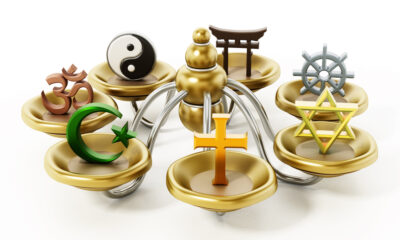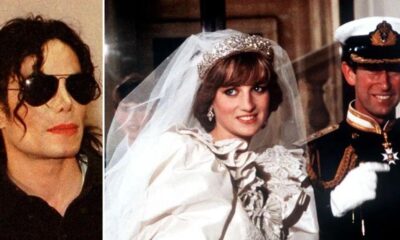Finance
Rituals Without Religion (with Michael Norton)

Intro. [Recording date: March 19, 2024.]
Russ Roberts: Today is March 19th, 2024. And, my guest is psychologist Michael Norton, the Harold M. Brierley Professor of Business Administration at Harvard Business School. He is the author of The Ritual Effect: From Habit to Ritual. Harness the Surprising Power of Everyday Actions. And that book is our topic for today. Michael, welcome to EconTalk.
Michael Norton: Russ, thanks so much for having me.
Russ Roberts: Let’s start with the difference between habit and ritual. And, I’m going to throw in routine. It’s not your subtitle, but you do talk about routine. So, as individuals, we have habits, we have routines, and we have rituals. They are somewhat similar, but they have very, very important differences.
Michael Norton: That’s right. I think that sometimes we use the word habit to refer to ritual. Sometimes we use ritual to refer to habit, and so we have been trying in our research to tease apart really what are the differences between these. And, I do think, as you said, that it ends up being quite important.
So, for me, habits and routines are things that are a bit dry. They’re unemotional. They are tasks that we need to get done, and when we do them, we can check them off our list. And good habits are great. I’m not anti-habit in any way. I should have better habits; I should exercise more and things like that. But, they are kind of a box-checking exercise, often.
Rituals, I think, are a bit more emotional and a bit more meaningful. They have more in them than just checking off a box. And, a silly example that I use, but I do think it highlights something, is if I ask people, ‘Do you brush your teeth first and then shower or do you shower and then brush your teeth?’ First off, weirdly, about half of people do one and half of people do the other. But, the important thing is if I say, ‘Hey, tomorrow morning or tonight before you go to bed, could you switch the order?’ And, about half of people say, ‘Sure, no problem.’ And, what would you say?
Russ Roberts: I would say that would be weird.
Michael Norton: It would be weird. They say, ‘Weird, odd, I don’t want to.’ And, if I say, ‘Why?’ they say, ‘I don’t know exactly, but I don’t want to.’ And, for me, that’s starting to get the difference between a habit and a ritual. So, if you can flip the order of those, they’re habits, they’re tasks, you got to clean your face, you got to clean your body, whatever. But, if the order matters to you, if for some reason you feel like, ‘Mm, I’d rather do that than that, than that,’ it’s starting to be a bit more ritualistic, bcause you can feel emotion in you as you think about it in a way that you might not with habits.
Now when I say ritual, I don’t mean people in robes with candles. That’s very far down the continuum from habit to ritual. But, as soon as we start to have that extra emotion, that feeling, that meaning, that preference to do it one way versus the other, I think we’re moving toward more ritualistic and away from kind of a dry habit.
Russ Roberts: And then, a routine would be–to me it’s more like I brush my teeth every twice a day is my routine. The habit is I do it after I shower. I just had to think there for a minute. And, the ritual would be, I have an incantation. I say when I spread the toothpaste onto the toothbrush, and I brush a certain number of times that evokes the infinity of the universe and, etc.
Michael Norton: That’s far down the continuum, I think, for sure. But, even with something, for example, like how you brush your teeth, it turns out that we have preferences for that. So, if you think of brushing your teeth, if you do it next time, you start in the same place, you do things, you end in the same place; and that also feels good. Now, you could brush your teeth in any order you want. The point is to get them clean. But, we have these feelings that if we do it in this particular way, in the way that I like to do it, it feels different to us. And, that again, is more than just a habit. It’s doing something else for us that’s a bit more emotional.
Russ Roberts: But, I want to disagree a little bit, which is kind of absurd: You wrote a book on ritual, and I didn’t. But habits are things we become accustomed to and why that is the case I think is fascinating. My 20-month year-old granddaughter must start her breakfast with a banana and we’ll be the person who tries to provide an apple or the oatmeal before the banana. And those are habits, to me. She has emotions about them. But, for me, ritual is more about meaning. Now, I think your book is about different kinds of rituals, which is why you’re allowed to call them whatever you want, but make a distinction between rituals that have emotional resonance with us, but also have–I think there is a category of ritual that’s deeper.
Michael Norton: I think that’s true. I think if you think of the word ‘ritual’–so there’s overlap between rituals and habits as we’re discussing right now, but the word ‘ritual’ is used for many things that really don’t have much to do with habits at all. So for example, a wedding is a ritual, and hopefully we’re not making a habit out of having a wedding every week with a new person or something like that. Funerals are a ritual.
So, the rituals, to your point, are a very broad, very emotional category of activities humans engage with. Some of them are at a cultural level, some of them have deep religious meaning; but some of them are these little ones that people do in their everyday lives that aren’t at the scale of ones with long history, but they do still have a little bit of that emotion and meaning in them. We prefer to do it this way because I’ll feel ready to start the day if I brush my teeth this way versus that way.
Russ Roberts: But, why is it–and you talk about athletes who have extended rituals for their either preparation for performance, either in sports or in music, in the case of musical performers, why do you think we like them? One thing that’s nice about your book is it forces you to recognize there’s rituals all around. They’re not religious, which is our usual connotation of the word. But, why are they comforting? Why does my granddaughter, for example, love her rituals? Why did my children love the rituals? In fact, to the point where it’s multistep, it’s not the banana starts the thing, bedtime had a–
Michael Norton: Of course–
Russ Roberts: very fixed rhythm to it. Why do the human beings like that, and why do athletes find that calming, which is I think the main reason they perform these rituals?
Michael Norton: I have to say that when I started studying rituals, I was doing it from a kind of removed scientific standpoint, studying what other people were doing as scientists sometimes do. And, when my wife and I had our daughter, we immediately–you take a kid home from the hospital and suddenly you’re responsible for a human. And, one of the things they need to do is sleep. We didn’t think of it as a ritual. We didn’t use the word ritual, but in retrospect it was like, ‘This stuffed animal, then this song, then we’ll do this book, then we’ll have this little snack and then we’ll do that book. And then, this other song.’ We really turned to–just like with your granddaughter–ritualistic behavior to try to ease her to sleep. And, I think I believe that it helped her sleep. But, what I do know is it very much helped us cope with the stress, because it’s so chaotic–you know, when you have a baby, everything is brand new to you.
And that, I think, is telling–that we thought we were doing it for her, but a little bit, we were doing it to help us manage our own stress. And, you do see in the research that as things become more stressful, people are more likely to bring ritual to bear. So, it’s almost as though we have within us a sense of, as things get very, very stressful, let’s pull ritual, as one. We can use many tools; we can take medication. There’s all kinds of things we can use. But, one of the things that we use now and throughout history is ritual. We turn to them, we create them, we rely on them in these moments of stress.
Russ Roberts: Yeah. Obviously, rituals, when we’re autonomous as adults, not as children, but I think it works the same for children. It’s a form of control in an uncontrolled world. I like to joke that when you get sent home from the hospital with the kid, they don’t give you a manual. There’s a lot of books–there’s plenty of books on it. They don’t help much. They help a little bit. Don’t want to say not at all, but there’s no real manual. And, I’ve never told a expectant parent, ‘Oh, you’re going to want to have a bedtime ritual.’ I think every parent finds out that they have one very quickly.
And, one of the reasons they find out is that if you deviate from it, you’ll be shouted down from the heavens by a very small, but very loud creature who is announcing a violation–literally a violation, an unacceptable break in routine–which is effectively, becomes a ritual. And, I wonder if how much that is the chaotic nature of, ‘You think your life is chaotic?’ Think about your kid who is in the womb, no worries, nothing to ever think about, and all of a sudden is in this very bright world with people in it. So, maybe rituals for newborns–and we never quite lose this–are our way of coping with the loss of control. I don’t know.
Michael Norton: Yeah. And, we do see, for example, that I think that a thing that we’re not built to do as humans, unfortunately, is just to tell ourselves to feel a certain way and then we can feel that way. It would be great if we worked that way, but we don’t.
So, if I’m very, very anxious about something, I can’t magically just say, ‘Calm down.’ And, immediately I’m calm. I wish I could, but it’s just not how we’re built. And so, we do all kinds of things to try to get that sense of calm. And, again, medication, cognitive behavioral therapy. There’s many, many things that humans have come up with to help us. But, as you said, I think in these moments where everything is chaotic, one of the things that we say is let’s do something orderly and repeated and see if that can help us get a little bit more sense of having a grip on things.
Russ Roberts: That inability to take suggestions from yourself, which should be a piece of cake. If it’s irrational to be nervous, reminding yourself of that doesn’t help us–which is always fascinating to me.
Russ Roberts: But, I want to ask you a question about athletes. It’s a little bit off the subject. Wade Boggs, baseball player, you mention–very, very into rituals. You only scratch the surface, as I’m sure you know. He ate chicken before every meal. He had to make certain Hebrew letters in the dirt with his bat. He was a strange person, at least in his rituals. But, he’s really good at what he does. He’s in the Hall of Fame. Now he did fail two out of three times. That’s the nature of being a baseball hitter. But, I always find it fascinating that certain performers are terrified despite being at a world-class level. While I suspect, and I might be wrong, others are more relaxed. Are there any great musical performers you think or great athletes who don’t get nervous?
Michael Norton: I’m trying to think if we came across any who have no sense of nerves before these big performances. I think that there’s been–for example, studies of baseball players. Wade Boggs is one of the extreme examples, but there are other extreme examples. Another Red Sox player, Nomar Garciaparra, was famous for his very elaborate rituals when he was hitting. This study showed–so they videotaped baseball players at that, and they found that they made an average of 83 movements. Now that’s a lot of movement. And that’s for each time they’re going to swing–you know, tapping the plate, touching the glove. You can think of all these movements that you would count. And, of course, they’re very regular. Right? So, if you do 83, you kind of do the same 83 each time, but there’s variance in it. So, some people do many fewer movements, some people do more movements.
So, I do think there’s a sense that some people use it more or have more elaborate rituals than others; but I don’t know of any really high-class performer–I’ve not come across one who doesn’t have something at least that they do, some little preference or way that they do things or how they put their shoes on or how they walk on stage that isn’t a little bit ritualistic in the sense that they could put their shoes on any way they want. They could walk on stage from the right instead of the left, but they just really want to do it the way that they’ve done it for years and years. It just makes them feel, ‘Okay, I’ve got this. I’m ready to go.’
Russ Roberts: I’m thinking about somebody like Yo-Yo Ma, one of the greatest cellists of our time versus, say, Mark Knopfler, one of my favorite guitarists. Mark Knopfler looks very relaxed up there. So does Yo-Yo Ma, to be honest. But I have a feeling Yo-Yo Ma has a lot of rituals that I wonder if Mark Knopfler does. I don’t know. Does he have anxiety before he goes on stage that his solos are not going to be as good as they should be? I don’t know. Maybe it’s improv versus following a set score, but it seems kind of strange.
Michael Norton: Yeah, I think one of the things that’s interesting is often these elite performers, they look perfectly calm, because they really are very, very good at what they’re doing. As you said, ‘Why would Wade Boggs be nervous about hitting? He’s one of the greatest hitters ever. Why would Mark Knopfler be nervous about it? He’s an amazing guitarist.’ And yet, sometimes we see that it’s these elite performers that rely on rituals even more than me, who has the pretty not very stressful life at all.
So, even though they’re way better at things than me, they actually are still bringing more ritual to bear often, I think, in order to cope with the massive uncertainty that they have to experience. If my class doesn’t go well today, not that huge of a deal. If Mark Knopfler falls on stage, it’s on YouTube all over the world for the rest of his life. So, I do think that we do, and of a funny way, we ratchet it up when the stress gets more and more intense.
Russ Roberts: Just to make one last Boston sports reference, then we’ll move away from both Boston and athletes. Larry Bird was famous as a trash talker. I think in his first three-point shooting contest in the locker room with the other contestants he said very calmly, ‘Who’s playing for second?’ and, just let it lay there. And, he did win. He was the best three-point shooter of that group, and he proved it, at least in that small sample.
But, it’s a fascinating thing that he exuded–he was famous for being calm on the court, but it’s very possible now that I think about it, your insights, that his trash talking was his ritual of calming his own nerves. It’s a bit of imposter syndrome. He’s–an athlete, I think, often has to face the reality that maybe they’re not what they used to be, or today they won’t be at the level they want to be. And, there’s luck. And, luck is painful. So trash talking as well as the glove adjusting, etc., of a baseball hitter, some of that maybe is just a way to assert, again, to assert control in a situation that’s actually unbearable. And the calmest ones might be the most nervous. The calmest-appearing ones.
Michael Norton: I think that can be true. I promise we’ll get off Boston sports, but Tom Brady was very well known for being incredibly calm under extreme pressure. In his seventh Super Bowl, he wasn’t as rattled as someone in their first Super Bowl. And so, again, you might think, ‘I bet he’s calm all the time. I bet he never uses ritual.’ But, there are funny stories, that: early in his career, they were on a losing streak. They took the game ball and Bill Belichick buried it and Brady went over and kicked it. He, like, kicked the dirt as if to say, ‘We’re leaving that football and that game behind us.’ That’s very, very ritualistic. And, he was using it there actually not to calm down before a game, but using a ritual to let something go and see if he could move forward.
So, even people who are calm and don’t necessarily use them to calm down can use them in many other domains of life, which I find very interesting.
Russ Roberts: Yeah. Let’s talk about how different rituals do different things. I was surprised, unless maybe I missed it, but I don’t think you talked about making tea. You talk about coffee at some point, but in Buddhism, tea-making is a thing; doing the dishes is a thing; and you do these things in a certain ritual manner to clear your head. And, the goal of the ritual is merely by focusing on the steps in and of themselves–so I understand it–you are clearing your head. Do you think that’s true? And, is that important?
Michael Norton: There is some data that–so, if you think about when you are nervous and you engage in a ritual, why it might calm you down. One reason that it can calm you down is it actually clears your mind of some of the anxious thoughts because there’s literally no room for them. Because if I am having to keep something in mind, ‘I need to do this, then I need to do that. The seventh step from now is this, so I better do this now,’ it’s just harder for me to keep saying, ‘You’re going to blow it, you’re going to blow it, you’re going to blow it.’ Because my voice is taken up by the ritual that I’m doing. And so, there is some evidence that part of why they’re helpful is that in fact they just occupy us, move us away from the negative emotions we might be having and just free us up a little bit to be in the moment rather than be worried about the moment.
Russ Roberts: Now, your book focuses on the–there are some religious examples in your book, but most of your book is about non-religious examples. Religious examples throughout most of history were about either connecting to the divine as perceived by the person doing them or connecting to your tribe. They’re about belonging, because you’re doing things that the other adherents are doing, and thereby you feel part of something larger than yourself. Most of those religious rituals are unavailable to many people today because they don’t have the belief. What do you think substitutes for that? What rituals are people using to fill that particular gap that I think is a very human one that people want to fill?
Michael Norton: Absolutely. If you look in human history, it’s extraordinary that every culture and every religion has developed rituals that reflect the values of the culture or the values of the religion. Very, very different from each other, exactly what the rituals are. And, yet the impulse is there to develop these, to kind of say, ‘This is who we are.’
I do think that when we lose some of those rituals, we could just say, ‘Well, that’s fine. We don’t need them.’ But, it doesn’t seem to be what humans do. It seems like we come up with new ones. Which again, I think is kind of suggesting there’s something in us that really likes these.
One example would be something like Burning Man, where that’s not religious. It’s not a thousand years old. But, you do a pilgrimage to a desert with like-minded people in order to connect, and then you burn a figure at the end. It’s very, very ritualistic. It doesn’t have the element of faith that some other rituals do.
But, I also think at a more local level, I think people through time, of course, but have their own family rituals. And, those family rituals can do many of the same things. Right? They can give you meaning, they can give you a sense of place, they can give you a sense of history. When we make this apple pie that is my great-great-grandmother’s recipe, by making that pie, I’m actually connecting myself back generations in my family in a way that’s hard to do without having some of these rituals in place. So we do, at kind of at a more micro level, create very similar things with our family dynamics in order, I think, to have those same kinds of feeling of connectedness, of meaning, of belonging. And, we do see in the research, families with rituals do feel closer together to each other than families that lack rituals.
Russ Roberts: Now, mourning–dealing with death–is an obvious case where through all of every culture, as you say, every religion has not just rituals around mourning, but often very elaborate ones. I vividly remember talking to Michael Brendan Dougherty about his book–I think I might get the name wrong–My Father Left Me Ireland. Is that the name of it? I hope. I hope that’s the name, but I’ll look it up later and we’ll correct it in the notes if I got it wrong.
But, he didn’t have–he had Irish roots: his father was from Ireland, his mother was from Ireland; but she moved to the United States, and he didn’t get passed on any Irish traditions. And, he resented it deeply. And, I said, ‘Well, in a way, you’d think it’d be better because–then you could just choose the best one,’ when somebody dies. You don’t have to be stuck with a wake and other Irish habits. You could choose your own: pick a Native American piece from there and another piece from Buddhism. But of course, we want our mourning rituals, and we want our great-great grandmother’s cake, not your great-great grandmother’s cake. Even if it tastes better than mine, I don’t care. How strange is that?
Michael Norton: It’s very interesting. That if you think of mourning:, what are we using rituals for when we mourn? We’re using it for lots of things, but one of the things we’re using them–for many people, they’re using them to connect to their faith and help them deal with their grief through faith. But, for many, many people, what they do is they offer, in a sense, an obligation. You could say an excuse to get together, or you could say an obligation to get together where everyone who knew this person has to come and gather on this day because our faith or culture says, ‘No, two days after.’ Or, ‘Five days after.’ Or, ‘One day before the funeral we do this.’ Different cultures have different ways of dealing with grief, but you have to do it.
And, I think if you think of grief as a lot of it is internal, you’re just coping with your own grief. But, a lot of it is social. We need social support to get through grief. And, funerals are in a sense, they make everyone who we love gather around us at least for one day. And, I think that’s very, very powerful.
And, to your point, when we lose those, we don’t just say, ‘Well, no more rituals, no more religious rituals. So, let’s not have anything.’ People come up with a different kind of non-religious service, a memorial service to serve the same function. So, even though the traditional ritual might not be in place, it’s as though we’re aware as humans: You know what? These are very, very important to do these things when someone passes away. Let’s develop our own to make sure that we have some of these features in place.
Russ Roberts: Two of my favorite stories in the book are related to death and mourning. Talk about what happened to Mike Brick, the musician, when he was dying.
Michael Norton: So fascinating. We think of death and memorials–literally memorial service is memory–meaning the person is gone and we remember them. And people make wonderful speeches about how meaningful this person was in their life and how much they loved them. And, Mike Brick, when he was diagnosed with cancer, they started planning something like that, and then suddenly they said, ‘Why would we do this after you’re gone?’ Why would everyone stand up and say how much they loved you when you’re not there anymore? And, once you hear that, you say, ‘My goodness, that’s so obvious, of course, that we should have’–I don’t know–they’re not memorial, they’re pre-memorial or whatever we might call them.
And that’s exactly what they did. Instead of doing it after they created this ceremony before where they could really do all the things that they loved, including play music. And, I think it’s such a wonderful example of rethinking what we are trying to do when we are going to be faced with grief. Absolutely there is nothing wrong with waiting until the person is gone and then having a funeral or another service, of course; it could be incredibly meaningful for people. But we also have other opportunities, and I think that Mike Brick and his wife said, ‘We could still do that if we want to, but why don’t we also do something while you are still here to honor you before you go?’
Russ Roberts: When I read that story, I found it so moving. It brought tears to my eyes. And, now that you’re telling it, I’m thinking, ‘But, what did they do when he did die?’ That’s my first thought, which of course, I’m sure they had a funeral.
Michael Norton: He was actually Catholic, so they did have a Catholic mass in the kind of traditional way. So, interestingly to your earlier point, they did a little bit of both. They relied on religious rituals and expressed their faith, and they also developed their own novel ritual to get some of these other elements as well.
Russ Roberts: And, I’ve never been to anything like that pre-memorial. And, part of me is thinking, ‘Oh, it must’ve been very incredibly sad.’ It was bittersweet: It’s one of the things that I think are some of the best moments in our lives are the mixture of the bitter and sweet. So, here’s a person who is dying, who is performing a song with his band that everyone loves and realizing they’ll never hear it again from that person. And, that’s heartbreaking. At the same time–and you think, ‘Well, how could that have been an enjoyable experience?’ And, yet it’s all of life. All of life is you say, ‘Well, you couldn’t have enjoyed it. He’s going to die soon.’ But, we’re all going to die soon. And, enjoying and feeling the joy of being with dozens, if not hundreds of people that love you and that you love is special. Doing it two weeks before you die versus two months before you die versus two years before you die, really, it’s kind of the same parade. I don’t know.
Michael Norton: One of the things that this research on rituals has really made me rethink is in fact the timing of them. When do we do them and when do we not do them? Even something like a wedding anniversary. We got married on this date in June, whatever it might be, and then every year on that date, we do something. But, why only do it once a year? You know what I mean? We’re not bound to only celebrate our marriage once a year. We can do it whenever we want. [More to come, 28:24]













